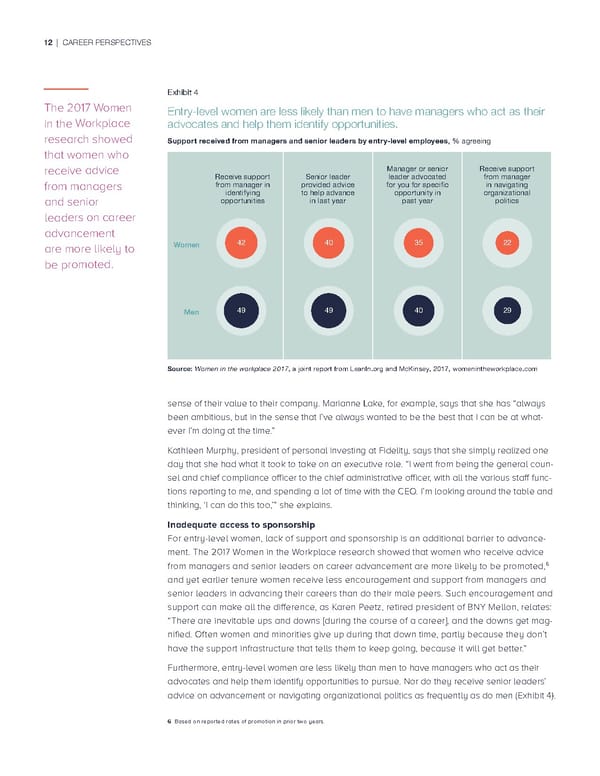12 | CAREER PERSPECTIVES Exhibit 4 omen The 2017 W Entry-level women are less likely than men to have managers who act as their orkplace in the W advocates and help them identify opportunities. research showed Support received from managers and senior leaders by entry-level employees, % agreeing that women who receive advice Manager or senior Receive support Receive support Senior leader leader advocated from manager from managers from manager in provided advice for you for specific in navigating identifying to help advance opportunity in organizational and senior opportunities in last year past year politics leaders on career advancement are more likely to Women 42 40 35 22 be promoted. Men 49 49 40 29 Source: Women in the workplace 2017, a joint report from LeanIn.org and McKinsey, 2017, womenintheworkplace.com sense of their value to their company. Marianne Lake, for example, says that she has “always been ambitious, but in the sense that I’ve always wanted to be the best that I can be at what- ever I’m doing at the time.” Kathleen Murphy, president of personal investing at Fidelity, says that she simply realized one day that she had what it took to take on an executive role. “I went from being the general coun- sel and chief compliance officer to the chief administrative officer, with all the various staff func- tions reporting to me, and spending a lot of time with the CEO. I’m looking around the table and thinking, ‘I can do this too,’” she explains. Inadequate access to sponsorship For entry-level women, lack of support and sponsorship is an additional barrier to advance- ment. The 2017 Women in the Workplace research showed that women who receive advice 6 from managers and senior leaders on career advancement are more likely to be promoted, and yet earlier tenure women receive less encouragement and support from managers and senior leaders in advancing their careers than do their male peers. Such encouragement and support can make all the difference, as Karen Peetz, retired president of BNY Mellon, relates: “There are inevitable ups and downs [during the course of a career], and the downs get mag- nified. Often women and minorities give up during that down time, partly because they don’t have the support infrastructure that tells them to keep going, because it will get better.” Furthermore, entry-level women are less likely than men to have managers who act as their advocates and help them identify opportunities to pursue. Nor do they receive senior leaders’ advice on advancement or navigating organizational politics as frequently as do men (Exhibit 4). 6 Based on reported rates of promotion in prior two years.
 Closing the Gap Page 13 Page 15
Closing the Gap Page 13 Page 15